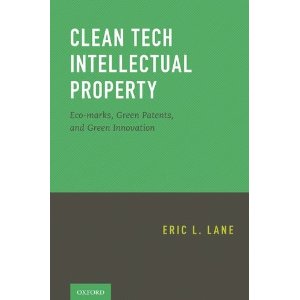In Clean Tech Intellectual Property: Eco-marks, Green Patents, and Green Innovation, author Eric L. Lane provides a concise review of the interplay of clean technologies and IP. In it, he treats clean/green tech IP as a discrete field apart from the general intellectual property law.

Green branding, greenwashing and eco-mark enforcement are covered in section three with special attention given to issues of eco-mark prosecution and green branding, from the brand owner perspective and from a consumer protection standpoint, including a discussion of greenwashing — the practice of companies spinning their not-so-green products and policies as environmentally friendly. Section four covers green patent policies, initiatives and debates including the Eco-Patent Commons for exchanging technology rights.
Rightfully, the book covers the debate over IP rights in low-income developing countries. Intellectual property issues come in to play with public policy questions about energy research and development. If someone develops a green technology, the best choice for the environment would be to give it away as cheaply as possible so that the maximum number of people could benefit. But giving a technology away undermines the incentives that private companies have to develop new technologies.
Similar to the debate regarding access to essential medicines, as poorer countries develop economically, their ecological footprint will grow. Affluent consumers have an interest in making this development as green as possible, but we are reluctant to let others free ride on our innovative work. To what extent should we share technologies with them, and on what terms?
“Clean Tech Intellectual Property: Eco-marks, Green Patents, and Green Innovation” provides a comprehensive review of intellectual property and clean technology. It can be dense with information but provides essential background to those new to the field. It’s clear that green is here to stay.
Clean Tech Intellectual Property: Eco-marks, Green Patents, and Green Innovation, 260 pp. is available from Amazon.
About the Author
Eric Lane is a patent and trademark attorney at Luce, Forward, Hamilton & Scripps in San Diego, where he is Special Counsel in the Technology / Intellectual Property practice group and the Climate Change, Renewable Energy & Sustainable Technology practice group

[…] Patent Baristas […]